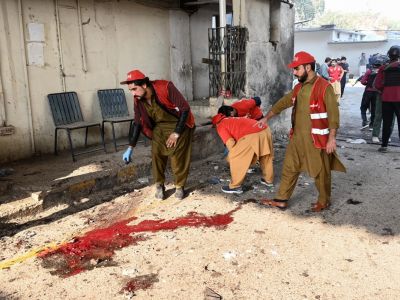Jordan’s King Abdullah, who arrived in Russia Sunday night, expressed hope that his visit would boost bilateral relations, especially in military terms.
The visit “will consolidate relations and find new opportunities for cooperation between the two states,” the monarch was quoted as telling the Russian news agency, Itar-Tass, upon arrival.
The Jordanian king arrived in Moscow, his first official visit to Russia, coming from Sofia, where he held talks with senior Bulgarian officials on bilateral issues as well as the Palestinian crisis.
The king said his talks with Russian President Vladimir Putin on Tuesday would open up “tremendous opportunities” in economic cooperation and political and cultural relations, the official Saudi Press Agency (SPA) quoted him as saying.
On his three-day visit to Russia, the king is expected to persuade Putin to become more involved in efforts to achieve a Palestinian-Israeli truce, Jordanian officials told the Jordan Times on Saturday.
In earlier remarks to the Wall Street Journal Europe, the German Financial newspaper Handelsblatt and the BBC, King Abdullah repeated his call for international observers to be sent to the Palestinian-controlled West Bank, warning that the violence there could spread, becoming a wider "Arab-Israeli conflict."
The king will also seek to purchase Russian arms and explore possibilities of technical training for Jordanian servicemen, the officials said.
Jordan's army is partially equipped with Russian armaments bought by the late King Hussein in the early 1980s. Its Russian-supplied arsenal includes air defense systems, tanks, vehicles and machineguns.
According to the paper, the king is trying to modernize the armed forces, which have suffered under 12 years of reduced state spending to ease the burden of Jordan's nearly $7 billion in foreign debt.
The United States vowed four years ago to develop Jordanian defense capabilities to reward it for its 1994 peace treaty with Israel.
Since then, US military aid has grown by 50 per cent to $75 million annually. Additionally, Washington has dispatched 16 F-16 jet fighters and other military equipment to Jordan, worth $300 million.
In 1998, Amman was accorded the status of a non-NATO ally of the United States, becoming eligible to receive used military hardware on a more regular basis.
The kingdom's ambassador in Moscow, Ahmad Mbaideen, in a statement to the Novosti Russian news agency, said Jordan would work to increase the volume of trade exchange between the two countries, presently amounting to $40 million.
Mbaideen also said Jordan wanted to develop economic cooperation with Russia, particularly in the tourism, industrial and agricultural fields - Albawaba.com
© 2001 Al Bawaba (www.albawaba.com)









